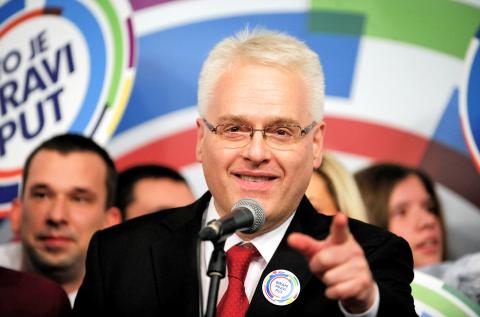Croatian President Ivo Josipovic and his conservative rival on Sunday headed for a runoff next month following a tight first round vote overshadowed by the country’s deep economic crisis.
Center-left incumbent Josipovic and his main challenger, Kolinda Grabar-Kitarovic, are to face off on Jan. 11 after both failed to win an outright majority in the race for the largely ceremonial post.
In a neck-and-neck first round, Josipovic garnered 38.56 percent of the vote compared with Grabar-Kitarovic’s 37.08 percent, the electoral commission said after 95 percent of polling stations had reported their results.

Photo: AFP
Bad weather and snow that hit most of the EU’s youngest member overnight did not appear to have affected turnout, which stood at 47.11 percent, up about 3 percent from the elections five years ago.
The soft-spoken Josipovic — the third president of the former Yugoslav republic since its independence in 1991 — is a member of the Social Democratic Party (SDP), the main partner in the ruling coalition.
The 57-year-old former law professor, who came to office on an anti-corruption ticket, famously played Beethoven’s Ode to Joy on the piano when Croatia joined the EU last year, hoping membership would revive its flagging economy.
However, the tourism-reliant economy of the small Adriatic nation of 4.2 million remains one of the EU’s weakest after six years of recession.
Unemployment is close to 20 percent, half of the country’s youth are jobless and public debt is close to 80 percent of GDP.
“We won in the first round; we will win in the second,” Josipovic told supporters at his campaign headquarters in Zagreb late on Sunday.
“My program offers Croatia more democracy, more human rights, tolerance,” he said, pledging to work toward an economy “without so many unemployed.”
Grabar-Kitarovic, 46, who represents moderates within the opposition HDZ, said voters had shown they wanted “change.”
“Croatia deserves, can and has to do better,” Grabar-Kitarovic — a former foreign and European affairs minister and an ex-NATO assistant secretary-general — told supporters at the HDZ election headquarters, vowing to lead the country “towards prosperity.”
During her campaign Grabar-Kitarovic had slammed Josipovic’s lack of initiative in tackling Croatia’s economic woes, accusing him of sharing the blame for the country’s ills.
The center-left government has been accused of failing to carry out the necessary reforms to address the country’s huge and inefficient public sector or improve the investment climate.
Though the president has limited powers — running the country is primarily left to the government — the election was seen as a key test for Croatia’s political parties ahead of parliamentary contests late next year.
Mario Rozankovic, a voter from Zagreb in his 30s, said he backed Josipovic because he viewed him as “honest, respectable, intelligent and capable.”
Ivan Janjic, a clerk in his 40s, said he backed the HDZ candidate.
“She is a genuine patriot who left a good job abroad to help her country,” he said.
The other two candidates in the race were rightist Milan Kujundzic and activist Ivan Vilibor Sincic, who is known for fighting against forced evictions for people who fall behind on debt repayments.
Sincic won 16.48 of the vote, followed by Kujundzic with 6.26 percent.

IDENTITY: A sex extortion scandal involving Thai monks has deeply shaken public trust in the clergy, with 11 monks implicated in financial misconduct Reverence for the saffron-robed Buddhist monkhood is deeply woven into Thai society, but a sex extortion scandal has besmirched the clergy and left the devout questioning their faith. Thai police this week arrested a woman accused of bedding at least 11 monks in breach of their vows of celibacy, before blackmailing them with thousands of secretly taken photos of their trysts. The monks are said to have paid nearly US$12 million, funneled out of their monasteries, funded by donations from laypeople hoping to increase their merit and prospects for reincarnation. The scandal provoked outrage over hypocrisy in the monkhood, concern that their status

Trinidad and Tobago declared a new state of emergency on Friday after authorities accused a criminal network operating in prisons across the country of plotting to kill key government officials and attack public institutions. It is the second state of emergency to be declared in the twin-island republic in a matter of months. In December last year, authorities took similar action, citing concerns about gang violence. That state of emergency lasted until mid-April. Police said that smuggled cellphones enabled those involved in the plot to exchange encrypted messages. Months of intelligence gathering led investigators to believe the targets included senior police officers,

The United States Federal Communications Commission said on Wednesday it plans to adopt rules to bar companies from connecting undersea submarine communication cables to the US that include Chinese technology or equipment. “We have seen submarine cable infrastructure threatened in recent years by foreign adversaries, like China,” FCC Chair Brendan Carr said in a statement. “We are therefore taking action here to guard our submarine cables against foreign adversary ownership, and access as well as cyber and physical threats.” The United States has for years expressed concerns about China’s role in handling network traffic and the potential for espionage. The U.S. has

A disillusioned Japanese electorate feeling the economic pinch goes to the polls today, as a right-wing party promoting a “Japanese first” agenda gains popularity, with fears over foreigners becoming a major election issue. Birthed on YouTube during the COVID-19 pandemic, spreading conspiracy theories about vaccinations and a cabal of global elites, the Sanseito Party has widened its appeal ahead of today’s upper house vote — railing against immigration and dragging rhetoric that was once confined to Japan’s political fringes into the mainstream. Polls show the party might only secure 10 to 15 of the 125 seats up for grabs, but it is